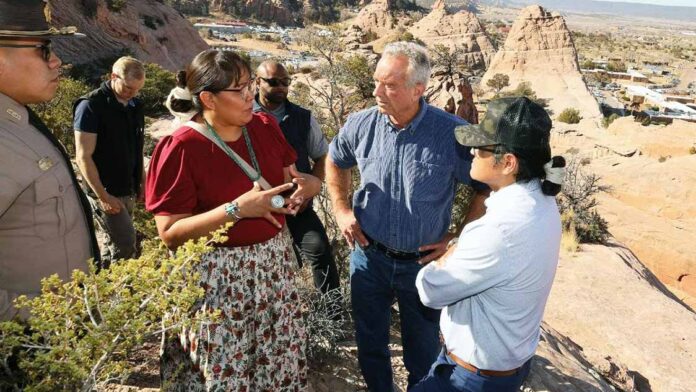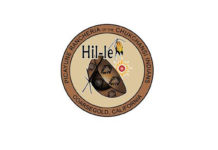
WINDOW ROCK, AZ – U.S. Secretary of Health and Human Services (HHS) Robert F. Kennedy Jr. visited the Navajo Nation for a government-to-government consultation with tribal leadership to assess the Nation’s most pressing health concerns. Members of the 25th Navajo Nation Council joined Navajo Nation President Buu Nygren for the Secretary’s visit.
Navajo Nation Council Speaker Crystalyne Curley emphasized the urgency of improving health infrastructure and services in rural communities. She pointed to persistent issues such as the lack of running water, inadequate transportation, and limited access to healthcare facilities, especially for elders and individuals with disabilities.
“We continue to advocate for safe drinking water, water lines, and accessible rural health clinics,” said Speaker Curley. “These are basic needs that remain unmet in many areas of the Nation. We also need strong advocacy to protect Medicaid, which is a lifeline for many of our families.”
Council Delegate Germaine Simonson highlighted the deep relationship between environmental wellness and community health in the Diné worldview. During the visit, tribal leaders hiked with Secretary Kennedy through areas rich with traditional medicines, using the moment to emphasize the need for holistic and preventive care approaches that include traditional and naturopathic medicine.
“We believe the health of our people reflects the health of our environment. Everything is interconnected – our land, our air, our spirit,” said Simonson, calling for the integration of these values into modern healthcare strategies serving Indigenous populations.
Council Delegate Eugenia Charles-Newton raised concerns about federal discussions regarding possible funding cuts to the Indian Health Service’s (IHS) Special Diabetes Program. She underscored the program’s vital role in combating diabetes. Charles-Newton also emphasized the need for increased staffing in regions affected by recent HHS restructuring, which has led to longer wait times and reduced access to services for many Navajo patients.
“The Special Diabetes Program is also a lifeline for our people,” said Charles-Newton. “Our clinics need adequate staffing and consistent support to deliver care without delay. These programs directly impact our families, our elders, and our children.”
Secretary Kennedy’s return to the Navajo Nation marked a personal journey, tracing back to a visit he made as a child with his father, the late Senator Robert F. Kennedy. Decades later, he returned to engage directly with tribal leadership and walk among the people, gaining insight into the challenges and resilience that define the Navajo experience.
The Secretary committed to advancing key health-related infrastructure projects, including the construction of a long-anticipated medical center in Gallup and the completion of vital water systems across the Navajo Nation. He also acknowledged the impact of poor nutrition and processed foods in contributing to chronic illness in Native communities and expressed support for locally led policies that aim to reverse those trends.
To ensure sustained partnership, Secretary Kennedy announced that a Navajo representative will be placed in his Washington, D.C. office to help elevate tribal concerns within HHS and monitor the progress of initiatives resulting from this visit.
“As leaders, we face a wide range of challenges, including health disparities like diabetes, staffing shortages caused by recent HHS restructuring, and the continued fight for access to essential services,” said Speaker Curley. “Our goal is to maintain and sustain the lives and well-being of our people. We’re looking to align our priorities with those of your administration so we can support each other in meaningful ways.”














































